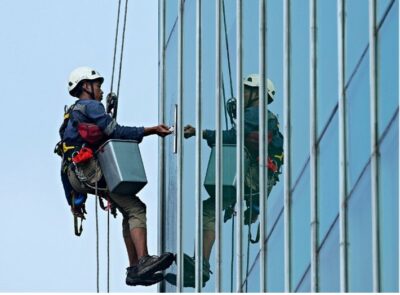Understanding Traumatic Brain Injuries: Common Causes and Insights

Traumatic Brain Injuries (TBIs) are a serious public health concern, affecting millions of people worldwide each year. TBIs can range from mild concussions to severe, life-altering injuries, and they occur when a sudden, external force disrupts the normal function of the brain. Understanding the common causes of TBIs is crucial for both prevention and early intervention.
- Falls: The Leading Cause
 Falls are the most common cause of TBIs, accounting for nearly half of all reported cases. These incidents can occur in various settings, from slipping in the shower, tumbling down stairs, or falling from ladders and/or scaffolding on the job. Older adults and young children are particularly vulnerable to fall-related TBIs, often due to balance issues or unsafe environments. Preventive measures such as installing grab bars, ensuring proper lighting, and using safety gates can reduce the risk significantly.
Falls are the most common cause of TBIs, accounting for nearly half of all reported cases. These incidents can occur in various settings, from slipping in the shower, tumbling down stairs, or falling from ladders and/or scaffolding on the job. Older adults and young children are particularly vulnerable to fall-related TBIs, often due to balance issues or unsafe environments. Preventive measures such as installing grab bars, ensuring proper lighting, and using safety gates can reduce the risk significantly.

- Motor Vehicle Accidents
Car, motorcycle, and bicycle accidents are another leading cause of TBIs, especially in younger adults. The sudden impact during a collision can cause the brain to violently shift within the skull, leading to bruising, bleeding, or even more severe damage. Wearing seat belts, using appropriate child safety seats, and wearing helmets while riding motorcycles or bicycles are critical steps in minimizing the risk of TBIs in accidents.
- Sports-Related Injuries
Contact sports like football, hockey, and soccer, as well as activities such as boxing and martial arts, are well-known for their association with TBIs. Concussions, the most common type of TBI in sports, have become a major focus of attention in recent years due to their potential long-term effects. Athletes, coaches, and parents should always be vigilant about proper safety gear, adhering to rules, and recognizing the signs of a concussion to ensure timely treatment and recovery.
Chronic Traumatic Encephalopathy (CTE) is a progressive and degenerative brain condition linked to repeated head injuries, including concussions and other forms of TBIs. Although CTE is most commonly associated with athletes in contact sports like football, boxing, and hockey, it also has been identified in military veterans and individuals with a history of repeated head trauma. CTE develops over time, often years or even decades after the initial injuries, and can lead to severe cognitive, behavioral, and emotional problems. Symptoms may include memory loss, confusion, impaired judgment, aggression, depression, and even suicidal thoughts.
Unfortunately, CTE can be definitively diagnosed only upon autopsy, which makes it challenging to address in living patients. However, growing awareness of CTE has led to increased focus on prevention strategies, including better safety protocols in sports, education on the risks of repeated head injuries, and ongoing research to develop early detection methods and treatments. The connection between TBIs and CTE emphasizes the critical importance of taking head injuries seriously and prioritizing brain health throughout life.
- Assaults and Violence
Assaults, including domestic violence, gunshot wounds, and other violent acts, are significant contributors to TBIs. These incidents often lead to severe brain injuries, due to the direct force applied to the head or penetration of the skull. In some cases, TBIs resulting from violence can lead to lifelong disabilities or even death. Addressing the root causes of violence, promoting conflict resolution, and increasing awareness of domestic violence resources are essential in reducing these types of injuries.
-
 Workplace Accidents
Workplace Accidents
Certain occupations carry a higher risk of TBIs, particularly in industries like construction, manufacturing, and agriculture. Falls from heights, being struck by heavy objects, or accidents involving machinery can all result in brain injuries. Employers must prioritize workplace safety by providing appropriate training, enforcing safety protocols, and ensuring workers have access to protective equipment.
- Explosions and Blast Injuries
Particularly for military personnel, TBIs often can be caused by explosions and/or blast injuries, which are common in combat zones. The intense pressure waves generated by blasts can cause significant brain trauma, even if there is no visible injury. These TBIs, known as blast-induced TBIs, can have complex and long-lasting effects, making early diagnosis and specialized treatment critical for veterans and active-duty service members.
Prevention and Early Detection
While not all TBIs can be prevented, taking proactive steps to minimize risks is essential. For individuals, this means making safer choices, such as wearing helmets, using seat belts, and taking precautions at home and work. For communities and policymakers, it involves creating environments that promote safety, from improving road design to enforcing regulations in sports and the workplace.
Recognizing the symptoms of a TBI, such as headaches, dizziness, confusion, and loss of consciousness, is vital for early detection and treatment. If you suspect someone has suffered a TBI, it is absolutely crucial to seek medical attention immediately. Early intervention can greatly improve outcomes and reduce the long-term impact of the injury.
Traumatic Brain Injuries are a serious and often life-altering event that can occur in a variety of everyday situations. By understanding the common causes of TBIs and taking steps to prevent them, individuals and communities can work together to reduce the incidence of these injuries. Whether through personal safety measures, community education, or policy changes, everyone has a role to play in making the world a safer place and minimizing the impact of TBIs on individuals and society as a whole.
We at the Herd Law Firm, PLLC, embrace these principles as we fight for victims of injuries of all kinds in all types of personal injury and death claims (and other matters we handle), and we never waver in our commitment to help these victims and their families in seeking the assistance and compensation they so need and deserve.
8/23/2024










